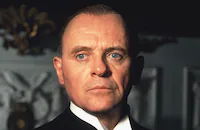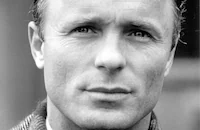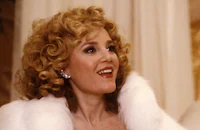Nixon
Brief Synopsis
Cast & Crew
Oliver Stone
Anthony Hopkins
Joan Allen
Powers Boothe
Ed Harris
James Woods
Film Details
Technical Specs
Synopsis
Although he's one of the most chronicled public figures of the 20th century, Richard Milhous Nixon remains an enigma to many, his decisions, motives and behavior often shrouded in mystery. With the ill-fated 1972 Watergate break-in and its tragic aftermath--culminating in the President's 1974 resignation--as its focus, NIXON examines its subject's complex life, including his difficult youth in Southern California and often troubled relationship with wife Pat. We also see Nixon's incredible political life, during which he held the offices of Congressman at age 33, Senator at 37, and Vice-President at 39, before losing the Presidential election in 1960 and the California gubernatorial race in 1962, making his startling comeback six years later to win two terms as President. With the inevitability of classical tragedy, Nixon's political career finally crumbles beneath the weight of his past, his ambitions, and his blindness to events just outside his often remarkable range of vision.
Director
Oliver Stone
Cast

Anthony Hopkins

Joan Allen
Powers Boothe

Ed Harris
James Woods
Bob Hoskins
David Paymer
J.t. Walsh
Bridgette Wilson-sampras

Annabeth Gish
David Hyde Pierce
John Stockwell
Raissa Danilova
Tony Goldwyn
Wilson Cruz
Alexander Butterfield
Tom Bower
Fima Noveck
Charlie Haugk
George Plimpton
Mikey Stone
Michael Kaufman
Ian Calip
Kamar De Los Reyes
David C. Potter

Robert Beltran
Mary Steenburgen
Tony Plana
Joanna Going
Sean Stone
Bill Bolender
Bai Ling
Ric Young

Larry Hagman
Kevin Dunn
Harry Murphy
Howard Platt

Madeline Kahn
Mike Kennedy
Paul Sorvino
Michael Chiklis
Michelle Krusiec
Sue Schnulle Murphy
Donna Dixon
John Bellucci
Ray Wills
John C. Mcginley
Julie Araskog
Drew Snyder
James Pickens Jr.
Julie Condra Douglas
Robert F Marshall
Peter Carlin
Jon Tenney
Ronald Von Klaussen
Dan Hedaya
Jack Wallace
Pamela Dickerson
Melinda Renna
Marilyn Rockafellow

Edward Herrmann
James Karen
Annette Helde
John Cunningham
Dr. Christian Renna
Richard Fancy
Peter P Starson
David Barry Gray
Victor Rivers

E. G. Marshall

Tony Lobianco
Tom Nicoletti
Boris Sichkin
Mary Rudolph
John Diehl
O'neal Compton
Enrique Castillo
Lenny Vullo
Fyvush Finkel

Saul Rubinek
Mark Steines
Wass Stevens
Zoey Zimmerman
Marley Shelton
Clayton Townsend
John Bedford Lloyd
Joshua Preston
Anthony T Samona

Brian Bedford
Corey Carrier
Chuck Pfeifer
Crew
Kimberly Adams-galligan
Michael Aguilar
Henry Alberti
Mary Anderson
Fred Arbegast
J H Arrufat
David Baldwin
Sidney R. Baldwin
Gregg Baxter
Lisa S Beasley
Lon Bender
Brian Berdan
Lucas Bielan
John Blake
Lee Blasingame
Sashy Bogdanovich
Merideth Boswell
Sarah Bowen
Steve Bowerman
Mark Bridges
Jim Brookshire
Bill Brown
Jason Bryant
Jon Bush
Alexander Butterfield
Dennis Butterworth
Ian Calip
Budd Carr
Chris Centrella
Jennifer Clark
Christian Clarke
Gary Clause
Mindy Cole
William Conner
Joseph Conti
Virginia Cook-mcgowan
Bryan Cooke
Cydney Cornell
Hank Corwin
Chris David
Peter Davidian
Sandy De Crescent
John Dean
Ann Marie Digioia
Dino Dimuro
Amy Dunn
Rickley W Dunn
Lou Economides
Steve Ellsworth
David Emmerichs
David Emmerichs
Victor Ennis
John Paul Filo
Jeff Flach
Carol Flaisher
Christine C Fransen
Erica Froker
Kevin M Gannon
Michael R Gannon
Bobby J Garren
Nerses Gezalyan
Scott Gillis
Nocolas Goddet
Carmine Goglia
Wayne D Goldwyn
Ann Goulder
Laura Graham
Tricia Gray
Dori Greenberg
Scott Griffin
Basil Bryant Grillo
Mindy Hall
Todd Hall
Dan Halsted
Eric Hamburg
Andrew Harland
Gary Hecker
Karen Higgings
Chris Hogan
Christer Hokanson
Mike Holowach
Billy Hopkins
Deirdre Horgan
Richard Hornung
Michael Hoskinson
Nicholas Irwin
Pat Jackson
Craig Jaeger
Chris Jargo
Jennifer Neysa Jew
Robert Kaiser
Marty Kassab-chaney
Stanley Kastner
Peter J Kelly
Victor Kempster
Dean M King
Eddie Kish
Carlin Kmetz
Roger Knight
Michelle Kurpaska
Mark Lanza
Albert Leon
Mike Levitre
Heidi Levitt
Chris Loudon
Sean R Maccaul
J. Fred Macdonald
Nancy Macleod
David Macmillan
Kelly Mahan-jaramillo
David Manley
Arthur Manson
Louis Marquis
Jo Martin
Paul Massey
Mary Mastro
Richard F Mays
Hugh Mccallum
Alan Z Mccurdy
Stacey S Mcintosh
William T Mckane
Michael A Mendez
Ryan T Mennealy
David L Merrill
Carla Meyer
Monika Mikkelsen
Deedee Montesanto
Maggie Murphy
Shawn Murphy
Sue Schnulle Murphy
Samuel Nalbone
Marilyn Nave
Carol Ness
Sylvia Nestor
John Neufeld
John Newman
Thomas J Norberg
Sandra Noriega
Valerie O'brien
Darrin O'hanlon
Alex Olivares
Kelly Oxford
John T Page
Kevin Patterson
Michelle Pazer
Amy Pearson
William Petrotta
Brian Pierson
David Pomier
Darrin C Porter
Robert A Preston
Meta Puttkammer
Brad Rea
Dr. Christian Renna
John Rice
Charlene Richards
Bruce Richardson
Robert Richardson
John D Riley
Stephen J Rivele
Wayne Roberts
Scott Andrew Robertson
Conception Roca
Paul M Rohrbaugh
Denyse Rossi
Sarah Rothenberg
Richard Rutowski
David Sardi
Jerry Sargent
Christopher Wells Scheer
Robert Scheer
Erica Schwartz
John P Sears
David Sharlein
Ed Simon
Tom Skulski
Fx Smith
Gordon Smith
Rachel C Smith
Richard Sobin
David Stanke
Kirk Starbird
Wylie Stateman
Barbara Ann Stein
James Stellar
Rob Stevens
Sunday Stevens
F Lee Stone
Oliver Stone
Oliver Stone
Cecil W Stoughton
Chris Strong
Jeffrey Ray Strong
Mark Sullivan
Bill Summers
Jesse Tango
Gregor Tavenner
Kayla Thames
Annie Tien
Clayton Townsend
Film Details
Technical Specs
Award Nominations
Best Actor
Best Dramatic Score
Best Original Screenplay
Best Supporting Actress
Articles
George Plimpton, 1927-2003

George Plimpton, 1927-2003
Nixon
In a 1995 interview with Salon.com, Stone was asked if he sought to "generate a certain buzz" with his choice of casting Anthony Hopkins, a Welshman with no particular physical resemblance to Nixon, in the title role. "I wouldn't characterize that as a motivation," he responded. "It works. He feels like Nixon. In The Remains of the Day [(1993)], I felt his sense of isolation, his sense of sadness. In Shadowlands [(1993)], there was an emotional fullness to his character. Hopkins is a complete actor. He's not like some of these by-the-numbers TV actors who have their bag of tricks." The actor passed on heavy make-up and obvious mimicry, but captured enough of Nixon's constrictive body language to convey his repression and loneliness.
Stepping off from the point in 1972 when the White House backed "plumbers" were caught burglarizing the Democratic National Headquarters at the Watergate Hotel, and concluding with the demise of the Nixon Administration two years later, Stone navigates the film's three hour running time in a non-linear fashion. The director's narrative interweaves the increasing desperation within the Nixon White House in its final days with the formative events in his life. From the strict and demanding upbringing at the hands of his Quaker mother (Mary Steenburgen) to the congressional career marked by the relentless red-baiting that paved his way to the Vice-Presidency to the embittering rivalry with John F. Kennedy, Stone made genuine effort to lend his subject dimension.
The resentment of JFK resonates through the course of the film, and culminates in a scene where Nixon sadly contemplates JFK's White House portrait and declaims "When they see you, they see want they want to be. When they see me, they see who they are." In an interview, Hopkins agreed that "it sums up his whole attitude about himself, Kennedy and the public who never loved him like he needed, but he could never had said such a thing. Not Nixon. If he had been that self-aware, he would not have been so miserable about it. Perception lightens our load."
Hopkins' efforts were complemented by those of Joan Allen, who had been working under film critics' radar for a decade before her performance as long-suffering First Lady Pat Nixon. Delivering a characterization that was surprisingly subtle yet emotionally complex, Allen garnered her first Oscar® nomination. Nixon would receive four Oscar® nominations altogether, with the balance going to Hopkins, John Williams' score, and the screenplay authored by Stone, Stephen J. Rivele and Christopher Wilkinson.
Another of the film's virtues is the large and talented roster of actors assembled to portray the major players in Watergate and the other key events of Nixon's career. The long list includes Powers Boothe (Alexander Haig), Paul Sorvino (Henry Kissinger), E.G. Marshall (John Mitchell), Bob Hoskins (J. Edgar Hoover), James Woods (H.R. Haldeman), J.T. Walsh (John Ehrlichman), Ed Harris (E. Howard Hunt), David Hyde Pierce (John Dean), Edward Herrmann (Nelson Rockefeller) and David Paymer (Ron Ziegler).
Critics of the film mostly leveled their complaints at Stone's scenario where dramatic license trumped historical accuracy, but the director, in a 1997 interview, expressed his own surprise at his film's sympathetic leanings towards its subject. "[A]t the end of the day it was really clear that a lot of the problems of Richard Nixon were really personal," he stated. "He distorted himself, in a sense. Instead of taking grace from power and doing something better with his power, he distorted into a darker side. That's what was interesting about the man."
Producer: Oliver Stone, Clayton Townsend, Andrew G. Vajna, Dan Halsted, Eric Hamburg, Richard Rutowski
Director: Oliver Stone
Screenplay: Stephen J. Rivele, Christopher Wilkinson, Oliver Stone
Cinematography: Robert Richardson
Film Editing: Brian Berdan, Hank Corwin
Art Direction: Richard F. Mays, Donald Woodruff, Margery Zweizig
Music: John Williams
Cast: Anthony Hopkins (Richard Nixon), Joan Allen (Pat Nixon), Powers Boothe (Alexander Haig), Ed Harris (E. Howard Hunt), Bob Hoskins (J. Edgar Hoover), E.G. Marshall (John Mitchell).
BW& C-192m. Letterboxed.
by Jay S. Steinberg
Nixon
Quotes
Trivia
Miscellaneous Notes
Ed Harris was a co-winner, along with Kevin Spacey, of the Broadcast Film Critics Association's 1995 award for Best Supporting Actor. Harris was cited for his performances in "Just Cause" (USA/1995), "Apollo 13" (USA/1995) and "Nixon" (USA/1995).
Winner of the 1995 award for Best Supporting Actress (Joan Allen) from the Boston Society of Film Critics.
Winner of the 1995 award for Best Supporting Actress (Joan Allen) from the Los Angeles Film Critics Association.
Winner of the 1995 award for Best Supporting Actress (Joan Allen) from the National Society of Film Critics.
Winner of the 1995 award for Best Supporting Actress (Joan Allen) from the Society of Texas Film Critics.
Winner of the 1995 award for Best Supporting Actress (Joan Allen) from the South Florida Critics' Association.
Winner of the 1995 awards for Best Director and Best Supporting Actress (Joan Allen) from the Chicago Film Critics Association.
Expanded Release in United States December 29, 1995
Expanded Release in United States January 5, 1996
Released in United States February 1996
Released in United States on Video July 9, 1996
Released in United States Winter December 20, 1995
Wide Release in United States December 20, 1995
Shown at Berlin International Film Festival (out of competition) February 15-26, 1996.
Began shooting May 1, 1995.
Completed shooting July 21, 1995.
Expanded Release in United States January 5, 1996
Released in United States February 1996 (Shown at Berlin International Film Festival (out of competition) February 15-26, 1996.)
Released in United States on Video July 9, 1996
Released in United States Winter December 20, 1995
Wide Release in United States December 20, 1995
Expanded Release in United States December 29, 1995













